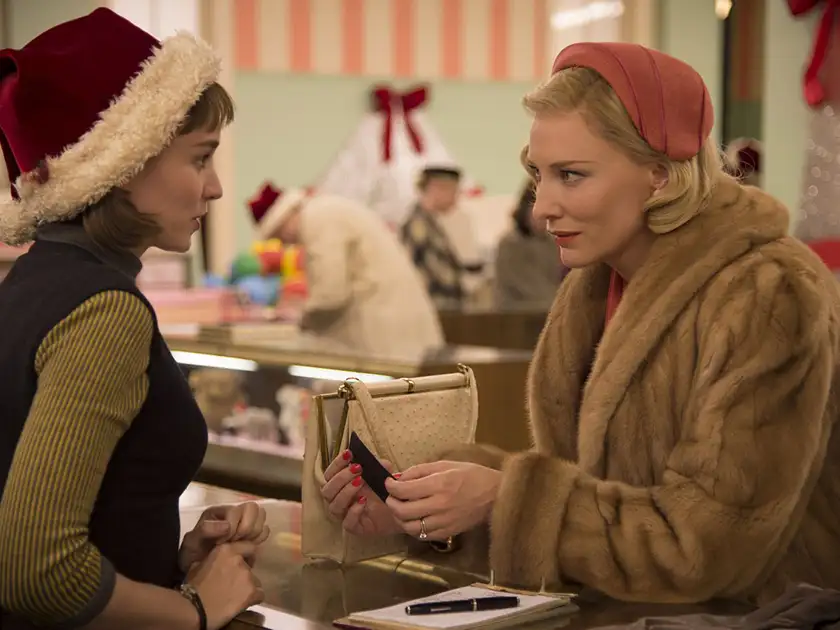Carol uses its beautiful winter atmosphere to guide the audience through a holiday journey of romance, heartbreak, and longing.
Todd Haynes’ Carol has been widely discussed in the years since its release, and for good reason: the film is one of the few modern romances that truly manages to break free of the genre’s traditional constraints and paint an entirely new, unconventional portrait of what love and romance can look like. It ditches the overly schmaltzy and idyllic tropes that often come alongside festive stories of love, replacing them with a much more grounded and realistic narrative that manages to maintain the warm hypnotism of romance without glossing over the more painful and less by-the-book corners of life. Much like his other projects May December and Far From Heaven, Haynes uses this film to complicate the audience’s understanding of love and prove that not only can it look different for every person, but even within the same relationship, the emotion can manifest in many different ways.
The premise of Carol is simple: when two women enter each other’s lives by chance during the holiday period, they develop a complicated romance that threatens to tear their families apart and rewrite the fabric of their lives. But it’s this exact simplicity that makes Carol so entirely unfamiliar. Despite the fundamental aspects of the story being very recognizable to most audiences, it’s in the details and small character developments where Carol diverts from expectation and rewrites the genre from the inside. Neither of these women are perfect: their flaws often outweigh their strengths and it’s not always easy for the audience to decide how they’re supposed to feel about this relationship, but that’s much more natural and similar to real life than the glamorised romances that are often put to film.
At its core, Carol is a story about how unavoidable and often inconvenient love can be. It can’t be controlled or tamed, and its presence certainly isn’t always desired. But despite these characters’ best attempts to keep their lives on track, it’s their compulsion for each other that brings them closer to each other and further away from everything else. Both Cate Blanchett and Rooney Mara turn in two of their best performances in the film, relying wholly on the chemistry between them to sell this relationship, but also maintaining the small details that make these characters fully-fleshed on their own. As mentioned, they’re flawed and often make mistakes, but it’s this realistic behaviour that makes their relationship all the more intriguing. It’s not a fairytale romance, but rather, at times, a nightmare one – and that’s undeniably more interesting to watch.

Haynes has a real knack for designing romances that, on the surface, are doomed to fail, yet he makes them utterly compelling through his keen eye for unconventional power dynamics, gender expectations, and subversion of the genre. Carol is arguably the director’s strongest work to date, taking all these ideas and bringing them together in this cinematic sandpit with two incredible actresses at the centre to forge something truly unique from it. It’s a real stroke of genius that only somebody with an innate understanding of humanity, love, and the complicated forces that bring the two together could ever conjure up.
There’s been an ongoing argument over the years as to whether Carol is really a ‘holiday movie’ or not, but in reality, the presence of Christmas in this story is actually crucial to its meaning. The holidays bring a sense of comfort to these two women, and it’s through this period of warmth and family that Haynes cleverly blends in themes of loneliness, isolation, and failing relationships that creates such a powerful dichotomy. Where many Christmas movies would be afraid to have their central characters going through divorce, grief, and crises of identity, Carol takes all this in its stride and makes it the centre of the story. It’s for this reason that Carol has become such a classic in the years since its release, and will continue to be respected for many Christmases to come, cementing Todd Haynes as one of the most intuitive and character-driven storytellers working today.
Carol is now available to watch on digital and on demand.
Loud and Clear Reviews has an affiliate partnership with Apple, so we receive a share of the revenue from your purchase or streaming of the films when you click on the button on this page. This won’t affect how much you pay for them and helps us keep the site free for everyone.

